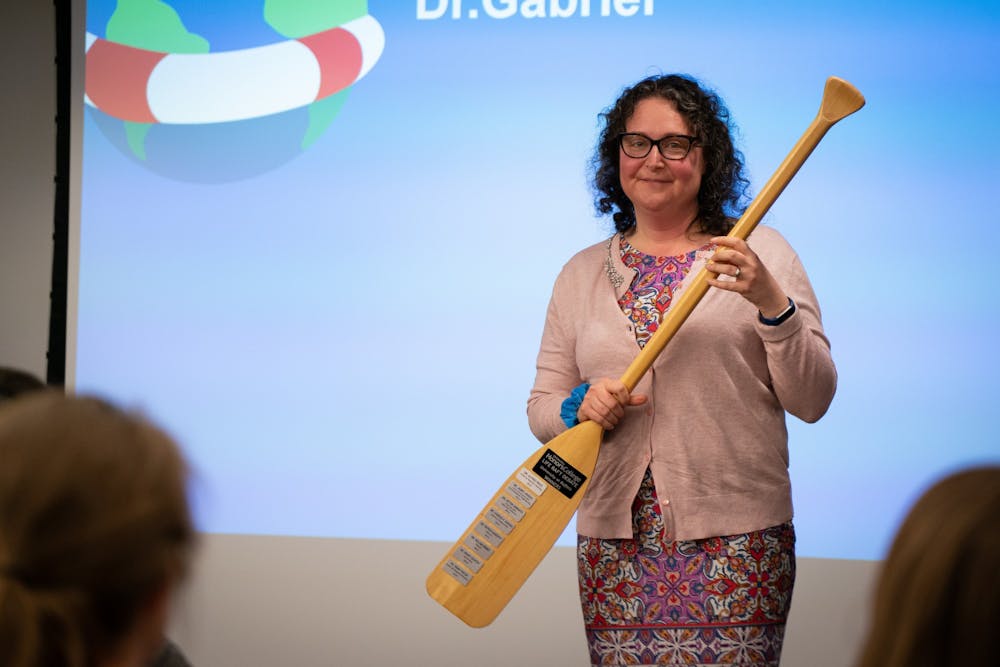Students felt Shira Gabriel was best equipped to help in a hypothetical apocalypse during UB’s annual Life Raft Debate on Wednesday.
Five faculty members from engineering and biostatistics, psychology, chemical and biological engineering, English and computer science departments tried to persuade roughly 90 students that their discipline would be more helpful than the others in a hypothetical apocalypse in Capen 107. Contestants had ten minutes to explain why their discipline would be useful in creating a new society and how their skills and knowledge would contribute positively to the new world. After each presentation, contestants had another ten minutes to add any information they missed, as well as time to refute their opponents’ arguments. Students voted on who deserved the last seat on their end-of-the-world life raft, and Gabriel won.
“When we build our new society, we want to do better,” Gabriel said. “We want to capitalize on the strengths, human beings have foibles and bad stuff about us. But we also have awesome stuff. And psychologists know both of those things.”
Gabriel based her argument on two main points: that people must have an understanding of multiple other disciplines to become a psychologist and that psychologists understand the strengths and weaknesses of humans and could use that knowledge in creating the new world. Psychologists study the structure of communities and the best ways people work with one another, according to Gabriel.
Tim Tryjankowski, director of the honors college research and co-curricular activities, said faculty members use the debate to educate students about the importance of their respective disciplines.
“The program has a very good reputation on campus and the faculty usually jump at the opportunity,” Tryjankowski said. “But you also want to educate the students as to the value of your discipline whatever it might be, and then they pitch, and usually in a very fun-loving way, why their discipline is better than the other four or five people next to them, and why they deserve the last seat on the life-raft to go off and recreate the world or save the world.”
The professors who did not win a spot on the students’ raft were Johannes Nitsche, a chemical and biological engineering professor; Dietrich Kuhlmann, a biostatistics professor; James Holstun, an English professor; and Andrew Hughes, a computer science and engineering professor.
Gabriel argued that psychologists could encourage people to interact with the environment in a more sustainable way than humans have done in the past and discussed the various types of psychology.
“Psychology is a broad field with many sub-disciplines which overlap with a lot of other disciplines,” Gabriel said. “If we’re going to build a new society, we need to figure out ways to do it, not just where we can build everything the best and strongest but, we have to not mess it up as human beings again.”
After the five contestants shared their arguments, a “devil’s advocate” –– Henry Louis Taylor Jr., an urban and regional planning professor and last year’s Life Raft Debate winner –– had 10 minutes to convince the audience that none of the disciplines should take the last seat on the raft. Taylor gave a passionate speech on social justice and argued that we shouldn’t pick one discipline over the other because we need all disciplines to work together to have a successful society.
Errick Williams, a junior psychology major, said he was convinced by Taylor’s argument.
“Despite me being a psychology major, [Taylor] really made an emphasis on the fact of equality,” Williams said. “He kind of reminded me of a democratic system, and that if you could put people first and help each other find out your own disciplines as a window to other disciplines, then we could actually become a better society for everybody.”
Leiya Davis-D’Aiuto is a staff writer and can be reached at news@ubspectrum.com





